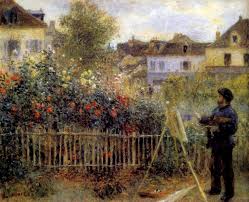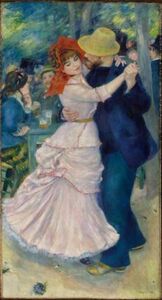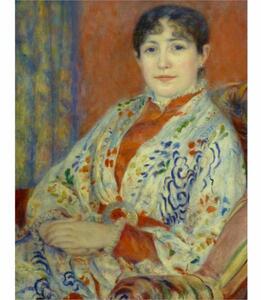Renoir
Reading Toward Renoir
Tuesday, July 16, 2013

Monet Painting in his Garden at Argenteuil, 1873, Wadsworth Atheneum
Renoir to me has always been the outlier – the one among the Impressionists without austerity enough to make room for me. Too sweet, too voluptuous. All skin, no air. But loved by Leo Stein, Gertrude’s brother, who understood Cézanne’s apples right away. When he and Gertrude split up the household they had for decades shared, both wanted the apples, but were content for her to keep the Picassos, him to take the Renoirs.
---
Stein was a man for whom sensuality was difficult and I’ve wondered if Renoir seemed to offer in an uncomplicated way, enjoyment. It sounds from the memoir written by the son, Jean Renoir, as if the painter was a rare person, fundamentally tolerant of himself and of other people. It’s true that his paintings show people taking pleasure in life. Who else does that? Perhaps some Dutch painters, though there is often a suspicion that Frans Hals is laughing at his revelers. In Renoir they take a quiet pleasure. Jean Renoir says the sitters have “serenity.” They are settled, but they are still full of the activity of being themselves; they look out on their surroundings and see much to interest them.
---
When the son spoke to the father of different women he had admired and painted, a great variety of women, society ladies and street walkers, the painter was full of appreciation, his greatest commendation, “she posed like an angel.” In the portraits, the sitter and the painter seem to share a lively and devoted understanding.
---
There is a Renoir of Monet in a garden painting. I wondered when I saw the reproduction recently if it were a Renoir or a Monet. The flowers have a lot of whites reaching upward in a way that I thought might be Monet, but when I checked the back flap I was not really surprised to see that it was a Renoir. The way to tell would have been to look at the figure, the painter in his hat, all his energy turned toward his craft. Features, soft, almost indistinct, but the impression of the face is of concentration and happiness. He could be humming.
---
Apparently Renoir loved all craftsmanship. He had himself begun by painting porcelain and then window shades. His father was a very good tailor. Renoir used to lament the passing of know-how and the replacement of hand industries by machines. He had felt grateful to grow up in the old Tuileries neighborhood before it was torn down – all the stairways and niches and small corner carvings of the buildings bespoke the loving care of craftspeople. Women, he told his son, at their daily tasks, know how to live. “Around them I feel happy.”
---
In a state of happy engagement people are very close to the surface, much closer then we usually are able to be even with close friends, whose faces barricade them in reserve. Perhaps what I have taken for too much luster, too much skin, is really more unsettling, the close presence of people in a state to which we are no longer accustomed, as we may find the unsanitized smells from earlier eras – a barnyard, a field of clover, dried lavender in sheets – overwhelmingly, almost intolerably, sweet.


